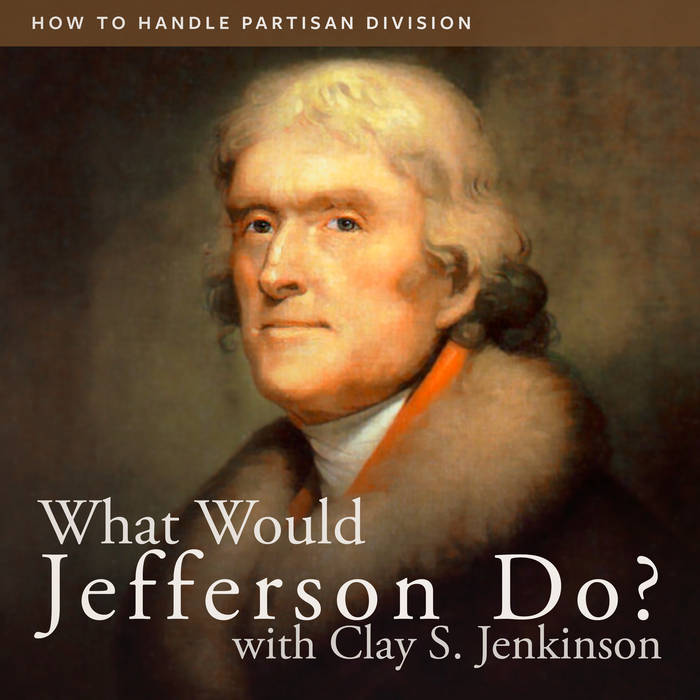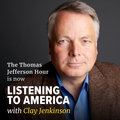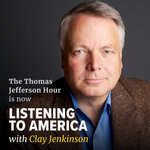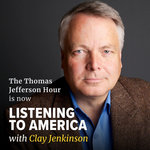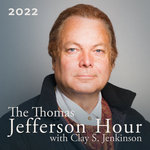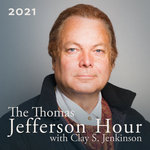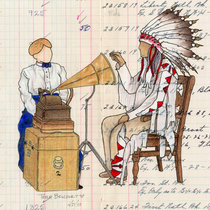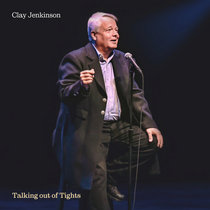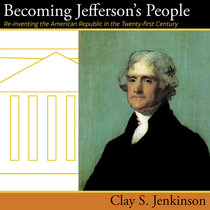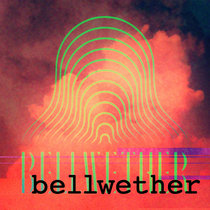
How to Handle Partisan Division
from What Would Thomas Jefferson Do? (2018) by Listening to America with Clay Jenkinson
1776 Club exclusive
-
1776 Club
Join now to receive all the new shows Listening to America with Clay Jenkinson creates, including 19 back-catalog releases, delivered instantly to you via the Bandcamp app for iOS and Android. You’ll also get access to supporter-only exclusives like this track. Learn more.Join Now $5 USD/month or more
about
DS: 00:00 Good day citizens and welcome to What Would Jefferson Do?, our weekly opportunity to discuss current American events with President Thomas Jefferson, who's seated across from me now. Good day to you, Mr. President.
CSJ as TJ: 00:15 Good day to you citizen.
DS: 00:16 Mr. President, I'd like to submit a question from a listener to you from a Mr Wayne Dillon. He writes, "How would you handle the present, divisive and acutely divided atmosphere within the federal government?"
CSJ as TJ: 00:29 Well, I believe that each faction, each party, has a moral duty to reach over to the other and to try to find common ground, and that each party should take the lead in being civil and respectful and generous. And if that happens, that both will move back towards each other and eventually there will be common ground. So the first thing is civility and an understanding that we as Americans share much more in common than those things that we disagree about. And I think perhaps that has been in part lost in your time. The second thing I did as president, when I knew that the federalists distrusted and disliked me, was to have a series of dinner parties in which I avoided political topics altogether. I had 10 or 12 guests, chose the guest list very carefully for a maximum of harmony. And the food and wines were so good and the general civility of the occasion was so great that many people who came wanting to dislike me wound up having a fair amount of affection and respect for me. And I found that that softened people's asperities and caused people to be a little more civil and a little more open minded than they might otherwise have been. So those would be two suggestions that I would make.
DS: 02:01 So it seemed that the magic of good food and drink did the job for you?
CSJ as TJ: 02:07 Well, we avoided political topics. I made sure from the guest list that the people who were there would be in harmony with each other. I never liked pitting people against each other at any time. And I made sure that the level of hospitality was such that everyone went away thinking, whatever my politics or whatever my political differences with Mr Jefferson or with his party, he's a good and decent host. This makes me feel a little bit less partisan, a little less distrustful. I think that humans are basically social animals, that we want to be harmonious, that we are forced into disharmony by political faction and by unscrupulous leaders and demagogues, but that if people were left to their own devices, they would almost invariably cheer up. And the best way to create that, in my opinion, is to create nonpartisan moments where people can see that there are not just representatives of this faction or that party, but fellow Americans who share almost a whole set of basic values that we care about this country. We want it to prosper. We want all sections of it to feel included. We want to believe that we live in a republican or democratic society. That we believe that the future will be bright and that humans are up to the challenge of self government. And I think if we keep emphasizing that with each other, that eventually it will begin to soften the partisanship which, which can poison any society.
DS: 03:43 Mr Dillon in his letter expresses to the concern that these differences might actually keep people from accomplishing the jobs that they were elected to do.
CSJ as TJ: 03:53 Well, I don't think the government was intended to do much. You know, the system was designed during the 18th century at the height of the enlightenment in a Newtonian era when the founding fathers were quite frightened of democracy. So they wanted to make sure that the people could not have automatic sway, that their will would not be automatically put into public policy. And so a series of checks and balances were built into the national government to make it a rather inefficient thing. And that was of course ideal in the 18th century when the ocean between us involved a six weeks journey, the pace of life and the mobility of life, and the connectivity of the world in your era may make that sort of slow, Newtonian, semi paralytic government a mistake. You may need to move more quickly in the world's arena than we did in my time. And in that case, I would urge you to tear up the constitution and start fresh and to build a system that's more efficient for the dangers and the opportunities of your own time.
DS: 04:55 Thank you very much, Mr Jefferson.
CSJ as TJ: 04:57 You're welcome, sir.
CSJ as TJ: 00:15 Good day to you citizen.
DS: 00:16 Mr. President, I'd like to submit a question from a listener to you from a Mr Wayne Dillon. He writes, "How would you handle the present, divisive and acutely divided atmosphere within the federal government?"
CSJ as TJ: 00:29 Well, I believe that each faction, each party, has a moral duty to reach over to the other and to try to find common ground, and that each party should take the lead in being civil and respectful and generous. And if that happens, that both will move back towards each other and eventually there will be common ground. So the first thing is civility and an understanding that we as Americans share much more in common than those things that we disagree about. And I think perhaps that has been in part lost in your time. The second thing I did as president, when I knew that the federalists distrusted and disliked me, was to have a series of dinner parties in which I avoided political topics altogether. I had 10 or 12 guests, chose the guest list very carefully for a maximum of harmony. And the food and wines were so good and the general civility of the occasion was so great that many people who came wanting to dislike me wound up having a fair amount of affection and respect for me. And I found that that softened people's asperities and caused people to be a little more civil and a little more open minded than they might otherwise have been. So those would be two suggestions that I would make.
DS: 02:01 So it seemed that the magic of good food and drink did the job for you?
CSJ as TJ: 02:07 Well, we avoided political topics. I made sure from the guest list that the people who were there would be in harmony with each other. I never liked pitting people against each other at any time. And I made sure that the level of hospitality was such that everyone went away thinking, whatever my politics or whatever my political differences with Mr Jefferson or with his party, he's a good and decent host. This makes me feel a little bit less partisan, a little less distrustful. I think that humans are basically social animals, that we want to be harmonious, that we are forced into disharmony by political faction and by unscrupulous leaders and demagogues, but that if people were left to their own devices, they would almost invariably cheer up. And the best way to create that, in my opinion, is to create nonpartisan moments where people can see that there are not just representatives of this faction or that party, but fellow Americans who share almost a whole set of basic values that we care about this country. We want it to prosper. We want all sections of it to feel included. We want to believe that we live in a republican or democratic society. That we believe that the future will be bright and that humans are up to the challenge of self government. And I think if we keep emphasizing that with each other, that eventually it will begin to soften the partisanship which, which can poison any society.
DS: 03:43 Mr Dillon in his letter expresses to the concern that these differences might actually keep people from accomplishing the jobs that they were elected to do.
CSJ as TJ: 03:53 Well, I don't think the government was intended to do much. You know, the system was designed during the 18th century at the height of the enlightenment in a Newtonian era when the founding fathers were quite frightened of democracy. So they wanted to make sure that the people could not have automatic sway, that their will would not be automatically put into public policy. And so a series of checks and balances were built into the national government to make it a rather inefficient thing. And that was of course ideal in the 18th century when the ocean between us involved a six weeks journey, the pace of life and the mobility of life, and the connectivity of the world in your era may make that sort of slow, Newtonian, semi paralytic government a mistake. You may need to move more quickly in the world's arena than we did in my time. And in that case, I would urge you to tear up the constitution and start fresh and to build a system that's more efficient for the dangers and the opportunities of your own time.
DS: 04:55 Thank you very much, Mr Jefferson.
CSJ as TJ: 04:57 You're welcome, sir.
lyrics
"I believe that each faction, each party, has a moral duty to reach over to the other and to try to find common ground, and that each party should take the lead in being civil and respectful and generous."
— Clay S. Jenkinson portraying Thomas Jefferson
— Clay S. Jenkinson portraying Thomas Jefferson
credits
from What Would Thomas Jefferson Do? (2018),
track released August 28, 2018
jeffersonhour.com/blog/1301wwtjd
jeffersonhour.com/blog/1301wwtjd
license
all rights reserved
tags
about
Listening to America with Clay Jenkinson
The Thomas Jefferson Hour is a weekly radio program dedicated to the search for truth in the tradition of Thomas
Jefferson.
Nationally acclaimed humanities scholar and award-winning first-person interpreter of Thomas Jefferson, Clay S. Jenkinson, portrays Jefferson on the program, and he answers listener questions while in the persona of our third president.
... more
contact / help
Listening to America with Clay Jenkinson recommends:
If you like Listening to America with Clay Jenkinson, you may also like:
